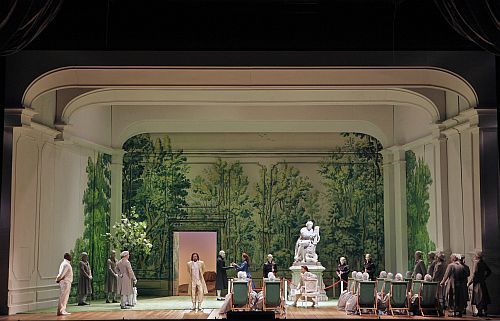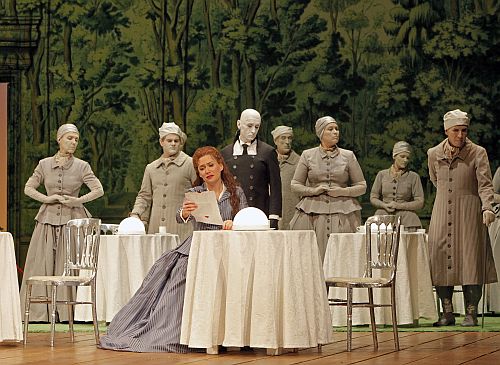Handel, Xerxes: Soloists, orchestra and chorus, San Francisco Opera, War Memorial Opera House, San Francisco. 4.11.2011 (HS)
Cast:
Xerxes: Susan Graham
Romilda: Lisette Oropesa
Arsamenes: David Daniels
Atalanta: Heidi Stober
Amastris: Sonia Prina
Ariodates: Wayne Tigges
Elviro: Michael Sumuel
Production:
Conductor: Patrick Summers
Production: Nicholas Hytner
Revival Director: Michael Walling
Production Designer: David Fielding
Lighting Designer: Paul Pyant
Chorus Director: Ian Robertson

Xerxes, Handel’s final opera, finally arrived at San Francisco Opera this season in Nicholas Hytner’s marvelously colorful and tongue-in-cheek production. Designed by Michael Fielding and originally staged at English National Opera in 1985, where it won an Olivier Award in London and was made into a terrific DVD, it has the charm to keep an audience chuckling, brimming as it is with inside theatrical gags (such as a lackey trimming the top of an artificial-grass curtain as if it were a hedge) and wily use of perspective. Michael Walling, who directed revivals of this staging at ENO and Houston, allowed the cast just enough mugging to amp up the humor without going too far over the top.
And this is, of course, a comedy. The real Xerxes, the Persian conqueror of many nations, may well have been one of the worst tyrants in history, but in this opera he’s smitten by a commoner named Romilda, who herself is in love with Arsamenes, Xerxes’ brother. The plot gets even more complicated, but fortunately the music makes it all worth it. And the cast, conductor and orchestra mined Handel’s rich vein of late Baroque music for its lapidary moments.
Let’s start with the orchestra. In the performance heard Friday (the third of six), conductor Patrick Summers, San Francisco Opera’s principal guest conductor, kept things lively and vivid, yet always graceful. High marks especially to the marvelous theorbo, lute and baroque guitar specialist, Michael Leopold, whose collaboration in continuos supporting recitatives added dazzling color. Is this the same orchestra that lunged and careened through an ill-judged Don Giovanni, heard just last week? Yes, it is, back to its usual deft self.
Leading a strong cast was mezzo-soprano Susan Graham, as Xerxes. She started off almost deferential, singing with too little personality in the first and most familiar aria from the opera, “Ombra mai fu.” But by the time she got to her final aria, “Crude furie degl’orridi abissi,” she was flinging out the histrionic coloratura with abandon. Graham’s sound is so polished and creamy, it’s surprising to hear it focus like a laser and deliver such a powerful climax. As an actress, her ease on stage allows her to react to the proceedings with such human instinct that it feels totally real, even as she aims to go over the top.

Counter tenor David Daniels, who often sings the title role, here took the part of Arsamenes, brother of Xerxes. These days, this role is usually sung by a mezzo-soprano, but Daniels invested it with a masculinity that made his frustration in his brother’s actions all the more compelling. The voice is as rich, focused and dead-on for intonation as always. Many mezzos must wish they could sing with such fluidity, depth and expression.
By giving this role to a man and making Xerxes a pants role for a mezzo, this production adds further gender confusion to a piece that includes the role of Amastris, a princess dressed as a soldier and sung by a contralto, and that of Elviro, Arsamenes’ servant, sung by a baritone but who dressed in drag for a whole comic scene as a flower woman. In his director’s note, Walling speculates on Handel’s sexual preferences and notes that the composer often “took great delight in the gender-bending possibilities” of Baroque opera. So why not extend it a bit? Certainly, one would be hard-pressed to find a San Francisco audience to complain.
As Amastris, the princess/soldier once betrothed to Xerxes, contralto Sonia Prina deployed rat-a-tat, pinpoint coloratura and dark timbre, surprising because of her short stature. She barely kept it going in her first-act aria, “Sapra delle mie offese,” but triumphed in every succeeding moment, even injecting some earthy humor into “Se cangio spolgia,” the drunken character breathing rapid-fire coloratura and alcohol fumes into the faces other guests in a coffee shop, the coffee-sippers reeling.
The two all-female roles were beautifully handled by tall, lovely young sopranos. Lisette Oropesa as Romilda, pretty enough for us to grasp why she could fascinate both Xerxes and his brother, displayed a pliant voice with refreshing accuracy in intonation and fearlessness going for high notes. The same could be said of Heidi Stober as her sister, Atalanta, although she wore glasses in an attempt to make her look less attractive. Their naturally flowing comic scenes were movie-worthy.
Two baritones who recently triumphed in Heart of a Soldier, Wayne Tigges as Ariodates (Xerxes’ brother) and Michael Sumuel as Elviro (his servant) secured the lower ranges of the score admirably. Tigges was on stage more, but Sumuel made the bigger impression with his comedic stage presence and flawless delivery.
Using an uncut score, this production brought in Xerxes at 3 hours and 35 minutes’ running time. With this many outstanding singers to relish and so many delightful directorial touches to giggle at (the servants, faces and hand painted white, putting up and taking down lawn chairs and other props, deadpan, were especially fine), the time just flew by.
Harvey Steiman